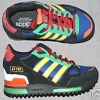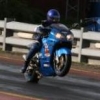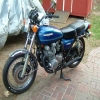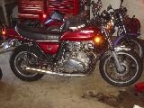- Posts: 762
- Thank you received: 5
dual front disk from single on 650
- Shoe48
-

- Offline
- User
- Live each day as it is your last
Please Log in or Create an account to join the conversation.
- 77KZ650
-
 Topic Author
Topic Author
- Offline
- User
- Posts: 1397
- Thank you received: 7
Post edited by: 77KZ650, at: 2006/03/03 01:04
07 MDP Rookie of the Year
01 ZX-12R street/drag bike. 8.97 @155.7 pump gas, dot tires, no bars, no power adders. top speed in the 1/4: 161MPH
Please Log in or Create an account to join the conversation.
- 77KZ650
-
 Topic Author
Topic Author
- Offline
- User
- Posts: 1397
- Thank you received: 7
Scott
07 MDP Rookie of the Year
01 ZX-12R street/drag bike. 8.97 @155.7 pump gas, dot tires, no bars, no power adders. top speed in the 1/4: 161MPH
Please Log in or Create an account to join the conversation.
- fixer5000
-

- Offline
- User
- Posts: 415
- Thank you received: 5
Do I need to get a larger master cylinder? (1/2 stock, up to 5/8?) thanks
Scott
read all this stuff...steve
kzrider.com/component/option,com_joomlab...ew/id,24883/catid,5/
kzrider.com/component/option,com_joomlab...ew/id,17871/catid,5/
1978 kz650b pretty much stock
\\\\\\\" get there fast but arrive alive \\\\\\\"
massachusetts
Please Log in or Create an account to join the conversation.
- steell
-

- Offline
- User
It's easier to lock the front brakes with a 1/2" cylinder than a 5/8" cylinder, some people have complained about the brakes being to touchy with the 1/2" on dual disks, while others have been happy with it. Either one works for me, but I'm a big guy with lots of hand strength
KD9JUR
Please Log in or Create an account to join the conversation.
- RetroRiceRocketRider
-

- Offline
- User
- ...bring in the machine that goes PING!
- Posts: 1641
- Thank you received: 29
Steell, I'm confused:unsure: I think I need an intro to 101 lol.
Ditto here. :huh:
From what I remember when I swapped from the 1/2" to the 5/8" master cylinder, is that the 1/2" or 5/8" sizing isn't the differences that the pistons travel, but is actually the piston bore diameter.
Please Log in or Create an account to join the conversation.
- steell
-

- Offline
- User
77KZ650 wrote:
Steell, I'm confused:unsure: I think I need an intro to 101 lol.
Ditto here. :huh:
From what I remember when I swapped from the 1/2" to the 5/8" master cylinder, is that the 1/2" or 5/8" sizing isn't the differences that the pistons travel, but is actually the piston bore diameter.
Yeah, I'm good at confusing people

The 1/2" and 5/8' does describe the cylinder bore, and with a 5/8" bore for an equal amount of lever travel it moves more fluid than a 1/2" bore (more displacement).
Let's see if I can keep from making this more confusing
I'll use round numbers to make it easier to understand, but they are not actual dimensions.
If you have a piston with 1 square inch surface area, and you apply 1 pound of force to that piston, then you generate 1 psi (pounds per square inch).
If you have a piston with 1/2" square inch of surface area, and you apply 1 pound of force to the piston, then you generate one pound of force per 1/2" of surface area, or 2 psi (you exert the same force but on half the surface area).
Now when you create 1 psi of pressure at the piston, (apply 1 psi to the fluid) the pressure at the other end is 1 psi, but the caliper piston is much larger (I'll use 10 square inch surface area for an example). So the 1 psi of pressure you generated by squeezing the brake lever is applied to a caliper piston with 10 square inches of surface area, and you are applying 1 pound per square inch of pressure to 10 square inches, and applying 10 lbs of force to the brake pads (1 x 10 = 10). To get the same pressure with the 1/2" master cylinder you would only have to apply 1/2 pound of force to the lever.
Keep in mind that in this example I am comparing a 1/2" master cylinder to a 1" master cylinder just to try and make it easier to understand.
A larger bore master cylinder moves more fluid per inch of movement than a smaller bore master cylinder, and the calipers require a specific amount of fluid to move a specific distance. So a 1/2" master cylinder is going to require more lever travel to move that specific amount of fluid than a 5/8" master cylinder (remember displacement).
Going back to the 1/2" and 1" comparison, a 1/2" cylinder will have to move twice as far as a 1" cylinder to move an equal volume, but the 1" cylinder would require twice the lever pressure compared to the 1/2" cylinder to generate equal psi.
Clear as mud? :laugh:
Post edited by: steell, at: 2006/03/05 14:17
KD9JUR
Please Log in or Create an account to join the conversation.
- RetroRiceRocketRider
-

- Offline
- User
- ...bring in the machine that goes PING!
- Posts: 1641
- Thank you received: 29
Math is the enemy! :woohoo:
LOL!
I "think" I understand it though.
For example, if I used a 1 1/2' wide push broom to sweep a pile of dirt, it would require less force than a 2' wide broom sweeping the same pile of dirt?
But wouldn't the amount (volume) of dirt being pushed by the 1 1/2' wide broom also be less than the 2' wide broom due to the differences in surface area that actually contacts the dirt?
I know in a master cylinder bore that the fluid can't flow over or around the piston like with a broom, so therefore the volume would/should remain consistent with identical forces applied to different sized pistons.
But I also thought that aside from the obvious longevity of hydraulic systems over cable operated systems, is that a hydraulic system is designed to require less effort or force to operate, regardless of bore/piston diameters and fluid capacities?
Dang it, now my head hurts. :huh:
I really need to limit myself to just ONE cup of coffee in the morning! :laugh:
Please Log in or Create an account to join the conversation.
- steell
-

- Offline
- User
A larger bore master cylinder moves more fluid per inch of movement than a smaller bore master cylinder, and the calipers require a specific amount of fluid to move a specific distance. So a 1/2" master cylinder is going to require more lever travel to move that specific amount of fluid than a 5/8" master cylinder (remember displacement).
Your broom analogy don't really work, and it's kind of tough to compare a mechanical brake system with a hydrualic brake system, the mechanics are different.
I think it's a whole lot simpler to just say that a dual disk brake system with a 1/2" master cylinder will be more "Touchy" than one with a 5/8" master cylinder

I have learned better than to discuss anything technical with my wife, her eyes just glaze over :laugh:
Post edited by: steell, at: 2006/03/05 15:09
KD9JUR
Please Log in or Create an account to join the conversation.
- 77KZ650
-
 Topic Author
Topic Author
- Offline
- User
- Posts: 1397
- Thank you received: 7
RetroRiceRocketRider wrote:
77KZ650 wrote:
Steell, I'm confused:unsure: I think I need an intro to 101 lol.
Ditto here. :huh:
From what I remember when I swapped from the 1/2" to the 5/8" master cylinder, is that the 1/2" or 5/8" sizing isn't the differences that the pistons travel, but is actually the piston bore diameter.
Yeah, I'm good at confusing people
The 1/2" and 5/8' does describe the cylinder bore, and with a 5/8" bore for an equal amount of lever travel it moves more fluid than a 1/2" bore (more displacement).
Let's see if I can keep from making this more confusing
I'll use round numbers to make it easier to understand, but they are not actual dimensions.
If you have a piston with 1 square inch surface area, and you apply 1 pound of force to that piston, then you generate 1 psi (pounds per square inch).
If you have a piston with 1/2" square inch of surface area, and you apply 1 pound of force to the piston, then you generate one pound of force per 1/2" of surface area, or 2 psi (you exert the same force but on half the surface area).
Now when you create 1 psi of pressure at the piston, (apply 1 psi to the fluid) the pressure at the other end is 1 psi, but the caliper piston is much larger (I'll use 10 square inch surface area for an example). So the 1 psi of pressure you generated by squeezing the brake lever is applied to a caliper piston with 10 square inches of surface area, and you are applying 1 pound per square inch of pressure to 10 square inches, and applying 10 lbs of force to the brake pads (1 x 10 = 10). To get the same pressure with the 1/2" master cylinder you would only have to apply 1/2 pound of force to the lever.
Keep in mind that in this example I am comparing a 1/2" master cylinder to a 1" master cylinder just to try and make it easier to understand.
A larger bore master cylinder moves more fluid per inch of movement than a smaller bore master cylinder, and the calipers require a specific amount of fluid to move a specific distance. So a 1/2" master cylinder is going to require more lever travel to move that specific amount of fluid than a 5/8" master cylinder (remember displacement).
Going back to the 1/2" and 1" comparison, a 1/2" cylinder will have to move twice as far as a 1" cylinder to move an equal volume, but the 1" cylinder would require twice the lever pressure compared to the 1/2" cylinder to generate equal psi.
Clear as mud? :laugh:<br><br>Post edited by: steell, at: 2006/03/05 14:17
VERY clear
I'll be staying with the 1/2 then, my concern was that it wasn't going to give me enough "stopping power" with 2 calipers. I'll be expecting the brakes to be much more touchy anyway since I'll be putting on the ZX calipers (I hope). And just having to pull the lever a little farther is no problem, I only drove the bike for a summer, Im sure it will be easy to get used to a new feel againB)
07 MDP Rookie of the Year
01 ZX-12R street/drag bike. 8.97 @155.7 pump gas, dot tires, no bars, no power adders. top speed in the 1/4: 161MPH
Please Log in or Create an account to join the conversation.
- wireman
- Visitor
Please Log in or Create an account to join the conversation.
- 77KZ650
-
 Topic Author
Topic Author
- Offline
- User
- Posts: 1397
- Thank you received: 7
Maybeive got a front mastercylinder for a zx-10 laying around here somewhere if you want it to match your calipers.:whistle:
07 MDP Rookie of the Year
01 ZX-12R street/drag bike. 8.97 @155.7 pump gas, dot tires, no bars, no power adders. top speed in the 1/4: 161MPH
Please Log in or Create an account to join the conversation.


